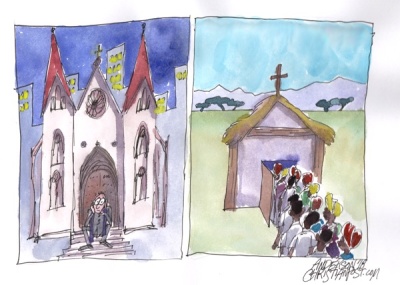Polls and God’s elect

Polls supposedly evincing the theological confusion of American Christians often remind me of my grandmother. To my knowledge, she was a believing Christian nearly all her long life. Once, as I drove her home from church, she responded to the sermon by saying she thought Jesus the Son was lesser than God the Father. After all, He is the Son. I responded Jesus had said He and His Father are one. Oh yes, she said, accepting the point.
Was my grandmother, who recited the Apostles Creed most Sundays, a heretic until that point? No, misunderstanding is not heresy, which entails intent. She attended church most of her life since girlhood, and likely she heard few if any sermons explicitly explaining the Trinity. How many even devout Christians really deeply understand even the basics about the mysterious Trinity?
A pollster, contacting my grandmother, may have reported her as one of millions of Christians who aren’t really Christian, since she mischaracterized core Christian doctrine. Such polls are often fatuous. Is there any time in the church’s history when the average even devout lay person could routinely articulate comprehensive orthodoxy about the Godhead or other key doctrines?
Most Christians not professionally trained, or whose vocation is not ecclesial, can readily articulate deep doctrinal understanding. They believe in Christ as their Savior, worship, pray, sacrifice, serve others, and live by faith. They mostly rely on clergy and teachers to explain doctrinal details. Ideally, every Christian would read and study deeply. But the reality is most don’t. And many who don’t are saintly and will occupy loftier spots in God’s Kingdom than the more educated and doctrinally articulate. Sanctification doesn’t necessarily entail cerebral theology or intellectual focus.
Polls like George Barna’s often ignore this distinction and assume that self-identified Christians who fail a theological litmus test are maybe something less than claimed. Such polls usually say only a small percentage of professing Christians actually have a “Christian worldview.” A recent survey from Barna’s Cultural Research Center at Arizona Christian University found that “Christian” in America today entails “often conflicting theological views” and “even beliefs that are thoroughly unbiblical perspectives.” No doubt! And so it likely has always been, including even among the first followers of Jesus who walked with Him and yet still did not fully understand.
This Barna survey found that 69% of American adults profess Christianity, 35% saying they are “born again,” but only 9% having a “biblical worldview.” Even fewer, just 6%, qualify as “Integrated Disciples” with both the right “worldview” and “consistent understanding and application of biblical principles.”
Of self-identified Christians, strong majorities offer traditional understandings about God as creator with their need to avoid sin and honor Him. But majorities, contra Christian teaching, also say people are good, all religious faiths are equal, affirm works righteousness, see the Holy Spirit only as a symbol, are relativistic, and believe in karma. Minorities affirm Christian sexual teaching or have confidence in salvation strictly through Christ. Even most self-identified “born-agains” backed moral relativism and salvation through works.
The Barna poll shows the 28% of Americans who specifically say they are saved by Christ, even if they don’t identify as “born again,” predictably have more orthodox answers. But even half of them think the Holy Spirit a symbol, and 40% say there is “no moral truth.” Even half of the 9% who are “Integrated Disciples,” who almost unanimously affirm Christian sexual teaching and reject abortion, still believe people are mostly good, while 25% are moral relativists.
These numbers are obviously distressing and, if taken literally, imply that America has almost no Christians who are faithful and understanding. Are only 2 or 3% of Americans truly Christian? Only the Lord knows. His mercy is wide, and we are warned against distinguishing the sheep and the goats.
I’m dubious that Barna’s ostensible moral relativists are truly so. And would many respondents, if gently reminded, quickly self-correct, as my grandmother did when reminded about Jesus’ equality with His Father? How many sincere Christians are simply inexact in answering polls rather than deeply ignorant or disobedient? And how many Christians with the right answers are actually disobedient in practice?
Christ’s followers included simple shepherds, fishermen, maidens, the adulterous woman at the well, the thief on the cross. They likely lacked correct answers about much, and Barna would have rated them as lacking a Christian worldview. But they knew Who could and is the Answer to all questions.
Whatever the questions, no poll can accurately tell us how many faithful people God has in America or anywhere. But Barna does remind us that the Church’s teaching office must always strive harder. And we all are called to know and witness to Him better.
Originally published at Juicy Ecumenism.
Mark Tooley became president of the Institute on Religion and Democracy (IRD) in 2009. He joined IRD in 1994 to found its United Methodist committee (UMAction). He is also editor of IRD’s foreign policy and national security journal, Providence.




























